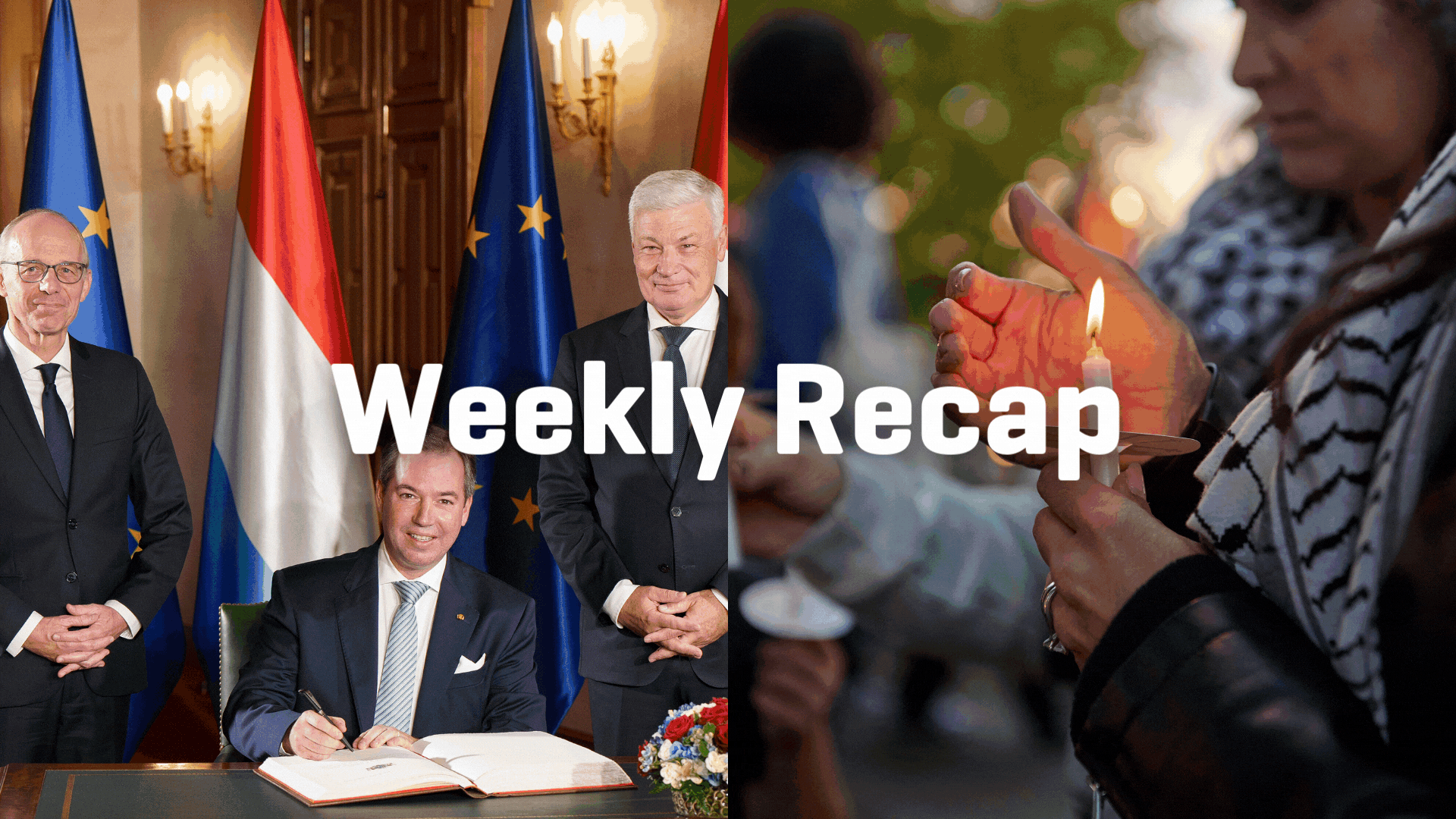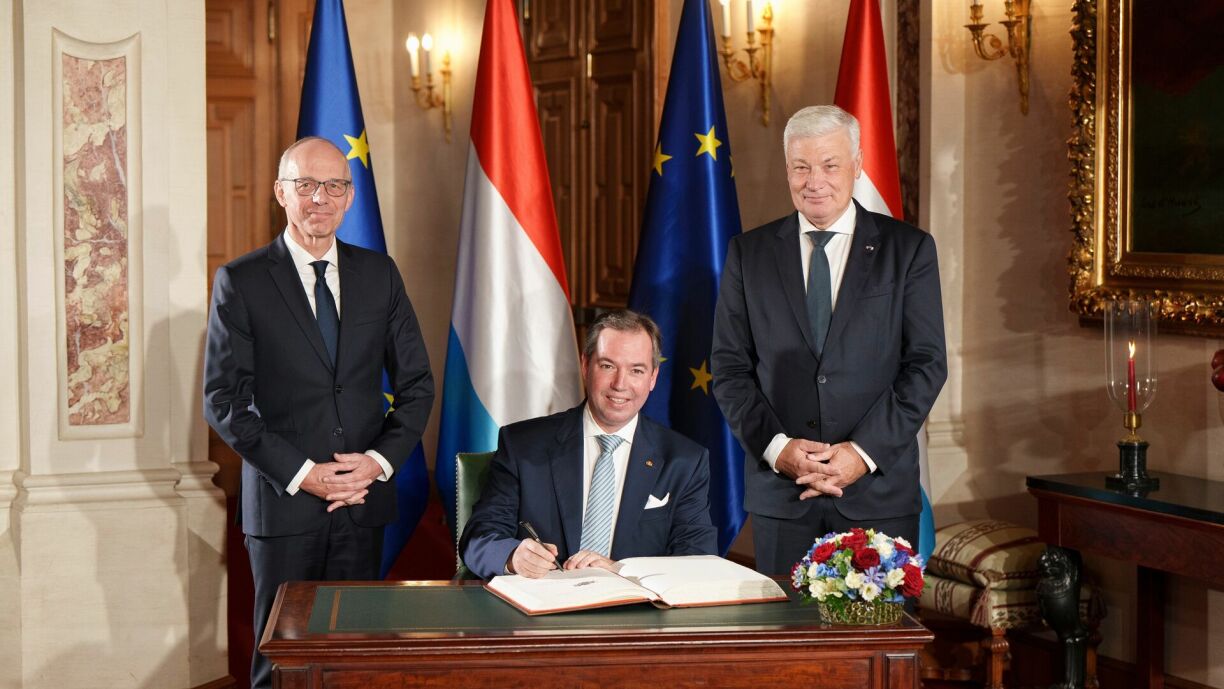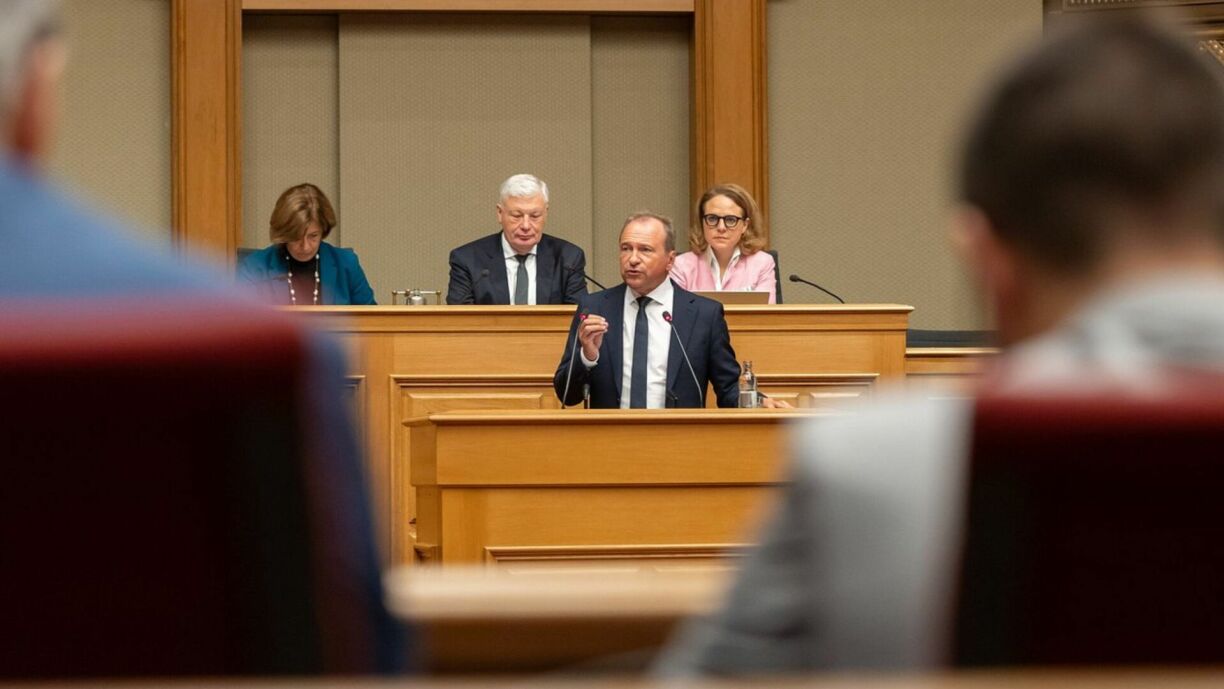
Here are five things you should know at the end of this week:

Prince Guillaume has been officially appointed as Lieutenant-Representative of Luxembourg, marking the first step toward his eventual role as Grand Duke, a gradual power transfer from his father, Grand Duke Henri.
Leadership transition – Prince Guillaume’s appointment as Lieutenant-Representative marks the first step toward his eventual role as Grand Duke. He was officially sworn in on 8 October, taking on a key symbolic role in the country’s unique tradition of gradual power transfer. This role allows him to begin assuming some of the responsibilities of his father, Grand Duke Henri, while the latter remains the official head of state. This process mirrors the one followed by Grand Duke Henri when he became the Lieutenant-Representative for his father, Grand Duke Jean, in the late 1990s. By holding this position, Guillaume will gradually take on more state duties, such as signing decrees and engaging in diplomatic activities as Luxembourg moves toward a smooth transition of leadership.
Balancing duties – Prince Guillaume has been in the public eye since birth, preparing for the eventual leadership of Luxembourg through his extensive international experiences, education, and various personal and professional projects. Throughout his public life, Guillaume has emphasised the importance of lifelong learning, evident in his decision to further his education in London in 2018. His relationship with Countess Stéphanie de Lannoy, which culminated in their 2012 royal wedding, has been central to his life, and together they share a commitment to promoting Luxembourg’s cultural and economic interests. Despite the public nature of his responsibilities, Guillaume has remained dedicated to his family, actively participating in the upbringing of his two sons, Charles and François.
Continuity and stability – While Grand Duke Henri has initiated the process of transferring power to his son, there is no set date for his formal abdication. Both father and son in a joint interview emphasised the importance of a smooth and gradual transition, with Guillaume learning the intricacies of governance as Lieutenant-Representative. The Grand Ducal Court is undergoing an internal reshuffle to prepare for Guillaume’s leadership, and he will have the opportunity to work with a new advisory team. This process reflects Luxembourg’s unique constitutional approach to monarchy, where a slow, deliberate handover of power allows for continuity and stability. During this transitional phase, Guillaume will maintain his current activities, including economic missions and engagements with Luxembourg’s youth, ensuring that he remains connected while stepping into greater state responsibilities.

Luxembourg’s 2025 budget, unveiled by Finance Minister Gilles Roth on Tuesday, projects a reduced deficit and stable public debt, with revenues growing faster than expenditures.
Key social measures include a tax-free minimum wage, increased subsidies, and a revised tax calculation for single parents, alongside a 50% reduction in home registration fees to stimulate housing construction.
Opposition parties have criticised the budget for being superficial, lacking in climate and healthcare funding, and for failing to address long-term financial sustainability.
A brief overview – Luxembourg’s 2025 budget forecasts a significant reduction in the state deficit, decreasing from €987 million in 2024 to €563 million by 2025, as part of what Finance Minister Gilles Roth described as a “responsible and sustainable financial policy”. The government’s focus is on reversing the trend where expenditures had previously outpaced revenues, commonly referred to as the ‘scissor effect’. Moving forward, revenue growth is expected to outpace spending, with revenues projected to rise by 5.2% against a 4.5% rise in expenditures. Although a €1.29 billion deficit is anticipated for the following year, public debt is projected to stabilise at 27.5% of GDP, which is considered manageable within the broader economic framework.
Benefits – The budget introduces several key social measures aimed at improving the financial conditions of low-income workers and single-parent families. Starting in January 2025, the non-qualified minimum wage will become tax-exempt, a move hailed by Roth as a “historic social advancement”. To further support vulnerable groups, the government will revise the tax calculations for single-parent households and increase the tax credit for these families. Additionally, the cost-of-living subsidy will rise by 10%, with a reduced residency requirement making it more accessible. The government will also triple the energy premium, which will be allocated based on social criteria. Housing affordability is addressed through a temporary 50% reduction in registration fees for home purchases, both for new and existing homes, aimed at stimulating the housing market and encouraging construction of off-plan properties.
Opposition criticism – Opposition parties have raised concerns about the budget’s lack of depth and long-term sustainability, criticising it as a collection of slogans rather than a comprehensive plan. The Greens (Déi Gréng) have particularly pointed out the absence of substantial new climate or environmental projects, while the Luxembourg Socialist Workers’ Party (LSAP) questioned the lack of concrete healthcare spending initiatives. Opposition leaders also expressed doubts about how the government intends to fund its social measures beyond increased excise duties on cigarettes. Critics argue that while the tax-free minimum wage and other social measures are commendable, they fail to address underlying structural issues and may place an additional financial burden on workers in the long run. There is also concern about the government’s reliance on economic growth to meet its budgetary commitments, which the Alternative Democratic Reform Party (ADR) see as unsustainable.

Trade unions OGBL and LCGB demand a referendum on the government’s proposed pension reform, criticising the lack of balance and exclusion of key groups from discussions.
The unions oppose any measures that could reduce pension benefits, propose improvements for women and students, and suggest long-term revenue solutions, despite the pension fund’s current surplus.
The government anticipates a pension deficit by 2027, with a final report on the reform expected in spring 2025 following public consultations.
Equal say in the matter – Trade unions OGBL and LCGB are strongly advocating for a referendum on the proposed pension reform, believing that all stakeholders, including cross-border workers, should have a voice in the process. They argue that the discussions surrounding the reform lack balance, particularly in terms of representation. While the government’s consultation process involved some sectors, it notably excluded groups like women’s organisations and pensioners’ representatives, raising concerns about a fair and inclusive approach. The unions also criticised the absence of Improov, a workers’ think tank, in favour of an employers’ counterpart, Idea, which further adds to the perception that the reform discussions are skewed toward employers’ interests.
Long-term sustainability – The unions firmly oppose any changes that would reduce pension benefits, especially a proposal to permanently tie pension adjustments to general salary trends. They maintain that pensions should only be adjusted based on the financial health of the pension fund, which currently has sufficient reserves. They are also calling for improvements to the minimum pension rate, which they say disproportionately affects women due to existing inequalities in the labour market. Additionally, they propose better conditions for students, recognising that certain groups are more vulnerable under the current system. The unions emphasise that although the fund is financially stable now, the government should explore new revenue streams for long-term sustainability, such as the introduction of a new tax.
Government strategy – Although Luxembourg’s pension fund currently holds a surplus of over €27 billion, forecasts indicate that the system will face a deficit by 2027, with reserves potentially depleted by the 2040s if no action is taken. The government, led by Health and Social Security Minister Martine Deprez, has suggested potential solutions, including extending the retirement age, increasing contributions, limiting early retirement, or even reducing pension benefits, though no firm decisions have been made yet. Acknowledging the sensitivity of pension reforms, particularly in light of recent protests in neighbouring countries like France, the government has opened a platform for public consultation and will conduct a survey in 2025 to gather feedback. The results will be analysed by expert groups, with a final report expected in spring 2025, ahead of any formal policy changes.

The first anniversary of the 7 October Hamas attack on Israel saw global memorials and protests, with world leaders and communities calling for peace, remembering victims, and urging the release of hostages, while pro-Palestinian demonstrations condemned ongoing violence in Gaza.
Israel continues its military offensives against Hamas and Hezbollah, expanding strikes into Lebanon and Gaza, leading to significant civilian casualties and displacement, while tensions rise over potential retaliation against Iran.
Global responses to the conflict include both pro-Israel and pro-Palestinian demonstrations, with international leaders calling for ceasefire and diplomacy to prevent further escalation and humanitarian crises.
Calls for peace – The first anniversary of Hamas’ 7 October attack on Israel was marked worldwide with memorials and protests. People gathered to honour the victims, with some expressing hope for the release of hostages still held by Hamas. Leaders, including President Biden and UK Prime Minister Keir Starmer, called for renewed diplomatic efforts to end the conflict. Demonstrations were held in various countries, including in Luxembourg, highlighting the widespread global concern for the humanitarian crisis in Gaza, as protesters urged governments to take stronger stances against the violence.
War efforts – Israel has intensified its military actions against both Hamas in Gaza and Hezbollah in Lebanon, resulting in extensive civilian casualties and widespread displacement. Prime Minister Netanyahu has vowed to continue these operations until Hamas and Hezbollah are subdued, warning that Lebanon may face destruction similar to Gaza if Hezbollah does not cease its attacks. Airstrikes have targeted key locations in Beirut and other regions, while Israel has expanded its ground operations in Gaza, tightening its blockade.
Opinions divided – Global responses to the ongoing conflict are sharply divided. Pro-Israel demonstrations and vigils were held across many nations, while pro-Palestinian protests also surged in many places, with demonstrators demanding an end to the bloodshed and accusing Israel of committing atrocities in Gaza. The UN and humanitarian organisations have raised alarms over the deteriorating conditions in Gaza, while world leaders like Pope Francis and the EU’s Josep Borrell have condemned the inability of world powers to prevent further escalation. The international community remains deeply polarised over the path forward as the humanitarian crisis deepens.

Hurricane Milton caused at least 11 deaths in Florida, primarily due to tornadoes, while also leaving millions without power and causing widespread damage.
Despite significant destruction, the storm was less catastrophic than expected, with officials crediting preparedness and some luck.
The storm has sparked political reactions, with climate change discussions and criticism from President Biden against Donald Trump over responses to recent hurricanes.
Tornadoes cause destruction – Hurricane Milton, which made landfall as a Category 3 storm, resulted in the deaths of at least 11 people across Florida. Most of these fatalities were caused by tornadoes spawned by the storm, particularly in areas like Fort Pierce, where a tornado struck a senior living community. The storm knocked out power to around 3 million homes and businesses, uprooted trees, and damaged infrastructure, including shredding the roof of a baseball stadium. Authorities reported that the worst of the damage came from tornadoes rather than flooding, and recovery efforts have been complicated by dangerous conditions such as downed power lines.
Luxembourgish journalist Eric Hamus, among thousands forced to evacuate Florida as Hurricane Milton made landfall, shared his harrowing journey north to safety, describing surging prices, packed supermarkets, and the tense atmosphere as residents braced for the storm’s impact.
Avoiding the worst – While Hurricane Milton caused widespread damage, officials noted that it was not as catastrophic as initially feared. Florida Governor Ron DeSantis acknowledged the significant impact but expressed relief that the state avoided the worst-case scenario. Communities in Florida, still reeling from Hurricane Helene just two weeks earlier, feared another disaster of similar scale. Fortunately, although the storm left behind considerable destruction and displaced residents, the damage was less severe than it could have been, providing some hope amid the long recovery process.
Political fodder – On the political front, President Biden and former President Trump traded barbs over their responses to recent hurricanes. Trump criticised Biden and Kamala Harris for allegedly neglecting hurricane victims, while Biden called Trump’s comments reckless and irresponsible. The back-to-back storms, Hurricane Helene and Milton, have not only devastated Florida but also become key points in the 2024 election discourse.
Business & Tech – Elon Musk’s social media platform X, which was banned in Brazil for 40 days in a legal tussle over disinformation, was available again in the country on Wednesday.
Science & Environment – Americans David Baker and John Jumper, together with Briton Demis Hassabis, shared the Nobel Prize in Chemistry on Wednesday for work revealing the secrets of proteins through computing and artificial intelligence.
Entertainment – Author Han Kang on Thursday became the first South Korean to win the Nobel Prize in Literature for her work exploring the correspondence between mental and physical torment as well as historical events.
Coronavirus – As Covid-19 cases rise in Luxembourg following the start of the new school year, health officials urge vulnerable groups to get vaccinated ahead of the winter season.
Crude song – The Grand Ducal Fire and Rescue Corps (CGDIS) has come under scrutiny after a viral video surfaced showing trainees singing a crude version of a Luxembourgish marching song, prompting an internal investigation and efforts to establish a “value charter”.
MP commemorated – A solemn moment transpired in parliament this Wednesday as MPs and government staff gathered to bid a final farewell to the late Christian Social People’s Party MP Max Hengel.

Your Weekly Recap is published every Friday at noon. Read earlier versions.